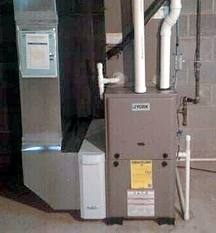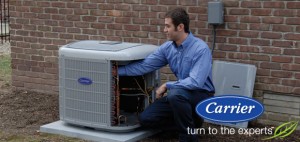How Central Air Conditioning Works
The typical central air conditioning system is a split system, with an outdoor air conditioning, or “compressor bearing unit” and an indoor coil, which is usually installed on top of the furnace in the home and cools the air as it blows through the coil.
through the coil.
 through the coil.
through the coil.-
Using electricity as its power source, the compressor pumps refrigerant, like R22 or R410a, through the system to gather heat and moisture from indoors and remove it from the home.
-
Heat and moisture are removed from the home when warm air from inside the home is blown over the cooled indoor coil. The heat in the air transfers to the coil, thereby “cooling” the air.
-
The heat that has transferred to the coil is then “pumped” to the exterior of the home, while the cooled air is pumped back inside, helping to maintain a comfortable indoor temperature.
- Based on the direction that freon flows through a heat pump, the Air Conditioning unit provides heating and cooling to your home.
Central Air Conditioning provides Heating and Cooling
Indoor comfort during warm weather – Central air conditioning helps keep your home cool and reduces humidity levels.
-
Cleaner air – As your central air conditioning system draws air out of various rooms in the house through return air ducts, the air is pulled through an air filter, which removes airborne particles such as dust and lint. Sophisticated filters may remove microscopic pollutants, as well. The filtered air is then routed to air supply duct work that carries it back to the home’s rooms.
-
Quieter operation – Because the compressor bearing unit is located outside the home, the indoor noise level from its operation is much lower than that of a free-standing air conditioning unit.





